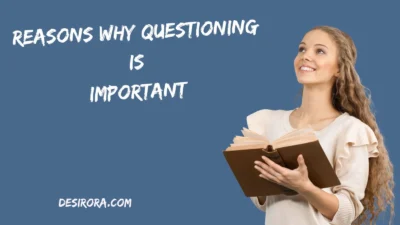Have you ever caught yourself reacting in a way you didn’t plan—snapping at someone, making a hasty decision, or feeling uneasy without knowing why? That tiny moment of recognition is the start of self-awareness. It’s the ability to look inward and understand what drives your thoughts, emotions, and actions.
In today’s fast-moving world, self-awareness is more than just a buzzword—it’s a life skill. It helps you see yourself clearly, recognise your patterns, and make choices that truly reflect who you are. Whether you’re navigating relationships, chasing career goals, or managing stress, understanding yourself from the inside out can completely change how you experience life.
In this article, we’ll explore the powerful reasons why self-awareness is important—how it shapes your mindset, strengthens connections, and fuels personal growth. You’ll also learn practical ways to cultivate it, avoid common pitfalls, and live more intentionally every single day.
What Goes On Before the Journey
- What is self-awareness?
- Why does it matter in real life?
- How can you tell if you’re becoming more self-aware?
- Common stumbling blocks on the path
What Is Self-Awareness?
Let’s start with a simple definition: self-awareness means being aware of your own thoughts, feelings, values, strengths, and weaknesses—and how these influence your behaviour and the way you show up in the world.
Psychologists often divide it into two main types:
| Type | Description | Example |
| Private self-awareness | Understanding your internal world—emotions, desires, motivations. | You notice you feel anxious before a meeting and wonder why. |
| Public self-awareness | Knowing how you appear to others and how your behaviour is perceived. | You realise you interrupt others often and how that might look. |
It’s more than just “knowing yourself.” It’s about understanding both your inner world and your impact on others.
Self-awareness is what separates conscious living from automatic reaction—it’s the bridge between who you are and who you want to become.
Why Self-Awareness Is Important
Here are the major reasons why being self-aware matters—for your work, relationships, well-being, and growth.
Better Decisions & Alignment
When you know your values, strengths, and weaknesses, your choices tend to align with who you truly are.
Example: You know you dislike last-minute chaos, so when a job offer comes with “unpredictable hours,” you think twice before saying yes.
Stronger Relationships & Communication
Self-awareness lets you see how your words and actions affect others. It improves empathy, listening, and authenticity.
Example: You notice your tone turns sharp when you’re stressed. Instead of snapping, you pause and explain, “I’m feeling tense today.” That small awareness prevents unnecessary conflict.
Personal Growth & Self-Improvement
When you can honestly assess your strengths and blind spots, you can intentionally grow. Reflection becomes your roadmap.
Example: You realise you procrastinate when tasks feel ambiguous, so you start breaking them into small, clear steps.
Mental Health & Well-Being
Recognising your emotional triggers helps you manage stress before it spirals. You catch your thoughts early and choose better responses.
Example: Instead of drowning in irritation, you notice it, take deep breaths, and respond calmly.
Leadership & Teamwork
Self-aware leaders are far more effective. They understand their emotions, own their mistakes, and create environments of trust.
Example: A manager who knows they dominate meetings intentionally steps back and invites quieter team members to share.
Types & Dimensions of Self-Awareness
| Dimension | What It Touches | Why It Matters |
| Emotional self-awareness | Understanding your feelings and their triggers. | Helps regulate emotions before they control you. |
| Cognitive self-awareness | Awareness of your thinking—beliefs, biases, mind-sets. | Helps you challenge false assumptions. |
| Behavioural self-awareness | Knowing how you act and how others perceive you. | Bridges the gap between intention and impact. |
| Social/public self-awareness | Understanding your presence in social spaces. | Helps you connect and communicate more effectively. |
| Values & identity self-awareness | Clarity about your purpose and what you stand for. | Aligns daily actions with deeper meaning. |
Synonym Table
| Term | Meaning | Example |
| Self-awareness | Conscious understanding of self | “Her self-awareness helped her stay calm.” |
| Self-knowledge | Knowing facts about yourself | “He had strong self-knowledge of his limits.” |
| Insight | Sudden understanding | “She gained insight into her behaviour pattern.” |
| Introspection | Looking inward | “His nightly introspection made him wiser.” |
Real-Life Examples & Stories
Story 1: Career Shift
Maria, a marketing manager, felt drained after each campaign. Through reflection, she realised her core value was helping people, not selling. She transitioned into corporate training—now she feels alive at work.
Lesson: Awareness of values + behaviour leads to fulfilling change.
Story 2: Relationship Improvement
James would snap at his partner after stressful days. He paused one evening and asked himself, “Why do I do that?” He realised it came from fear of not being enough. Once he owned that, his reactions softened.
Lesson: Self-awareness turns reactivity into empathy.
Story 3: Leadership Growth
Omar, a startup founder, noticed morale was dropping. When he asked for honest feedback, his team said he wasn’t listening. He started weekly open-floor meetings and admitted when he was wrong. Productivity soared.
Lesson: Self-awareness transforms leadership.
Practical Ways to Build Self-Awareness
- Journalling: Reflect on your feelings and actions each day.
- Mindfulness: Take five minutes daily to notice your breath and thoughts.
- Feedback: Ask trusted friends, “How do I come across?”
- Pause Before Reacting: When triggered, ask, “What’s happening inside me?”
- Identify Strengths & Weaknesses: Write them down and revisit monthly.
- Clarify Values: List what truly matters to you.
- Notice Body Signals: Pay attention to tight shoulders, fast heartbeat, or clenched jaw—they speak volumes.
- Daily Check-In: Ask yourself, “How am I feeling? What influenced me today?”
“When you’re self-aware, you stop running on autopilot—you start steering your own ship.”
Common Misconceptions & Pitfalls
- “Self-awareness makes you perfect.” No—it helps you understand, not eliminate, your flaws.
- Confusing self-awareness with self-consciousness. The first is healthy observation; the second is anxious overthinking.
- Too much reflection can lead to rumination. Healthy awareness inspires growth, not guilt.
- Expecting instant change. It’s a lifelong practice, not a weekend project.
- Awareness without action. Knowing isn’t enough—you must apply what you learn.
How Self-Awareness Boosts Different Areas of Life
At Work & Career
- Helps you pick roles that fit your strengths.
- Improves teamwork and leadership.
- Prevents burnout by recognising early stress signs.
In Relationships
- Reduces misunderstandings.
- Builds empathy and emotional intimacy.
- Encourages honest, open communication.
In Personal Growth
- Increases adaptability.
- Helps identify limiting beliefs.
- Encourages self-compassion.
In Decision-Making
- Creates clarity before acting.
- Reduces impulsive or regretful choices.
- Aligns decisions with long-term goals.
Grammar & Language Tips
- Use active voice: “I noticed” instead of “It was noticed by me.”
- Use personal pronouns: “You,” “we,” and “I” make writing relatable.
- Avoid repetition: Replace “self-awareness” with synonyms like insight or reflection.
- Add idioms naturally: “Get your ducks in a row,” “read between the lines,” or “on the same page.”
- Maintain rhythm: Mix short, punchy lines with longer, thoughtful ones.
Example idiom:
“When you’re self-aware, you finally get your ducks in a row—emotionally, mentally, and socially.”
The “Why” Behind the “What” – The Science of Self-Awareness
Scientific studies show that people with higher self-awareness:
- Experience greater emotional intelligence and resilience.
- Handle stress more effectively.
- Are rated as better leaders and communicators.
- Report higher overall satisfaction and happiness.
This happens because self-awareness activates brain areas linked to self-reflection and empathy. It literally helps you understand yourself and others on a deeper level.
Summary Table: Top Reasons & Actions
| Why Self-Awareness Matters | Key Benefit | Practical Action |
| Better decision-making | Aligns choices with true self | Write a reflection after each big decision |
| Stronger relationships | Builds trust and empathy | Ask loved ones for honest feedback |
| Personal growth | Encourages self-improvement | Track emotional triggers weekly |
| Well-being | Reduces stress | Practice daily mindfulness |
| Leadership | Creates authentic influence | Review your behaviour after meetings |
Conclusion
Becoming self-aware isn’t a one-time event—it’s a lifelong journey. It’s about being curious rather than critical, intentional instead of impulsive. When you cultivate self-awareness, you see your emotions clearly, make better choices, and strengthen your relationships.
It gives you the power to rewrite your story consciously—to live by design, not by default. Every moment of awareness becomes a small act of transformation. So start today: pause, reflect, and listen to yourself. The answers you’ve been seeking might already be within you.
FAQs
Q1: Can self-awareness be developed?
Yes. Through journalling, feedback, mindfulness, and consistent reflection, anyone can grow more self-aware over time.
Q2: Is self-awareness always positive?
Mostly, yes. But too much analysis can lead to overthinking. Balance reflection with action.
Q3: What’s the difference between self-awareness and self-confidence?
Self-awareness means knowing yourself. Self-confidence means trusting yourself. One informs the other.
Q4: How often should I reflect on myself?
Even a one-minute check-in daily helps. The key is consistency, not length.
Q5: What if I discover uncomfortable truths about myself?
That’s part of growth. Accept those truths with compassion—they’re not flaws, they’re feedback.

Aldous Huxley was a visionary writer and philosopher whose works explored human nature, consciousness, and the future of society. His ideas continue to challenge minds and inspire generations.



